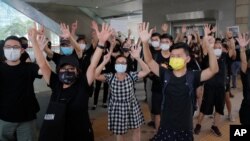A Hong Kong news website said on Thursday that authorities had rejected a visa for an Irish journalist working there without providing a reason, stoking concerns about media freedoms under Beijing's new national security law for the city.
Aaron McNicholas, who covered the city's sometimes-violent anti-government protests last year, waited almost six months before being told his visa had been denied, the outlet said.
McNicholas was employed by Bloomberg at the time of the protests.
"It seems we have been targeted under the climate of the new security law and because of our impartial and fact-based coverage," HKFP editor-in-chief Tom Grundy said in a statement.
The news website would press the government to offer reasons for the denial and would consider an appeal and legal challenge, he added.
The Hong Kong government and immigration department did not immediately respond to a request for comment.
Media groups said the move reflected an acceleration in the decline of press freedoms under the security law which punishes what Beijing defines as subversion, secession, terrorism and collusion with foreign forces with up to life in jail.
"Denial of a work visa to a thriving local news operation bashes the most basic promise of press freedom given repeatedly by the Hong Kong government," said Steven Butler, Asia Program Coordinator of the Committee to Protect Journalists.
"It also severely undermines Hong Kong's status as an international city and financial center, which cannot flourish unless journalists are free to do their work."
Journalists in the former British colony have told Reuters they fear the legislation could be used to silence media and crack down on freedom of expression, concerns the Hong Kong government has rejected.
The semi-autonomous city is guaranteed freedom of speech and the press under Article 27 of the Basic Law, the mini-constitution agreed by China when it took back control of the global financial hub in 1997.
The news comes more than a month after The New York Times said it would shift part of its Hong Kong office to Seoul as it faced challenges securing work permits.
The Hong Kong government said at the time the city remained a regional media hub.
Hong Kong Rejects Journalist's Visa, Stoking Press Freedom Concerns




